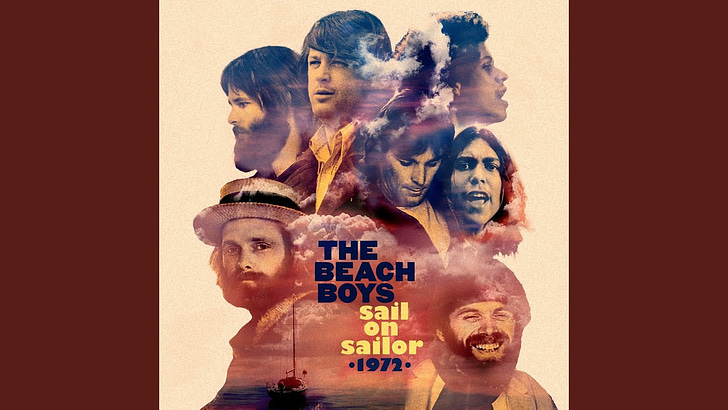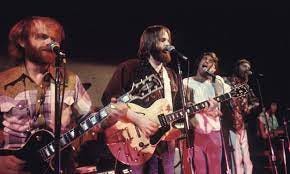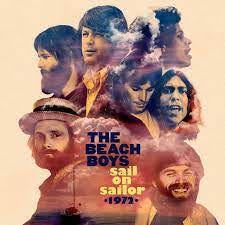The Beach Boys in 1972
Exhaustive new set argues for reappraisal of Holland, contains unreleased Carnegie Hall show
Mark Linett and Alan Boyd, the production team responsible for last year’s exhaustive and eye-opening Feel Flows box from the Beach Boys, have just dropped an even more significant trove: Sail On Sailor – 1972.
Unless you’re a Beach Boys obsessive (and therefore know about the potency of this under-discussed era), prepare to recalibrate your estimation of the band. Because this set, available in several configurations, contains some of its most inventive work from the post-surf period – the Carl and the Passions and Holland albums as well as a previously unreleased November 1972 concert at Carnegie Hall. There’s also plenty of the by-now-expected outtakes and stray rehearsal moments.
Full disclosure: I haven’t made it very far with the outtakes. That’s partly because of the live recording, which presents the Beach Boys as an engaged – and resourceful – seven piece ensemble. We know from the various documentary accounts that there was turbulence swirling during this time (Brian Wilson, the principal composer, was not involved in touring, for one thing). But when they went to work, the live Beach Boys crew was capable of conveying and sometimes expanding the impressionistic arrays of Sunflower (1971) and Holland – and then could turn around and tear through lean, disciplined versions of classics like “Don’t Worry Baby.” Not everything is perfect; check the wobbly pulse of “Heroes and Villains,” which seems to push the singers close to train-wreck territor
The show captures the image-makeover of the Beach Boys that was then still in progress: The lineup of Dennis and Carl Wilson, Mike Love, Al Jardine, Blondie Chaplin, and Ricky Fataar executed the trickier new material with precision, and rendered the hits in a muscular, assertive style that registers as far more vital than your typical oldies-tour fare.
Many artists and critics have marveled at the transformation of the Beach Boys during this period; until this release, the primary documents have been the studio recordings. The Carnegie show sharpens the picture considerably. Elvis Costello, who caught the Beach Boys on a UK tour stop before the Carnegie Hall date, recalled “That was an incredible thing to see; because although the main writer wasn't present, you realized that they had reclaimed themselves as a creative band away from the cliched idea of these guys that sing these car songs and dress in stripey shirts."
As ever, the songs themselves were the catalyst of the directional shift. Some of the material on Carl and the Passions and Holland was written by Brian Wilson, other songs came from a circle of musicians surrounding the Beach Boys at the time. There was a lot of variety in terms of songwriting approaches: At this particular crossroads, the band was testing out its own version of contemplative acoustic-guitar California soft-rock, while singing passionately about man’s impact on the natural world (“California Saga”) and exploring beautifully harmonized gospel settings laced with spiritual imagery (“All This Is That”). There are colorful bursts of orchestral pop genius (“Sail On, Sailor”) and lilting piano ballads like “Leaving This Town” that catch the influence of the late Beatles – and, in turn, likely influenced Elton John, Steely Dan and other ‘70s hitmakers. There are also curious indulgences like the Mount Vernon and Fairway (A Fairytale) EP, a narrative fable that carries the instruction “please listen in the dark” and was bundled with the original 1973 release of Holland.
It had been a very long time since I heard “Marcella” and the hard rocking “You Need A Mess of Help To Stand Alone,” not to mention the entirety of the luminous Holland. It was thrilling to encounter these carefully remastered versions, which are sharp and invitingly transparent. And then that thrill was repeated, and sometimes magnified, by the Carnegie Hall performances. You almost can’t help but marvel at the intricate renderings: Here’s this established band, fresh from studio sessions that put its iconic sound through a radical spin cycle, nailing the broad strokes and the tiny details of a reinvention.
Yes, we have a digital suggestion box. Please share your favorite overlooked/underloved records at: echolocatormusic@gmail.com.







Well rendered Tom, insightful, carefully articulated. A pleasure to read cudos from a fellow jazz enthusiast, from the Grove in the 70’s & 80s. Rick Spisak
“feel Flows” is a masterpiece…